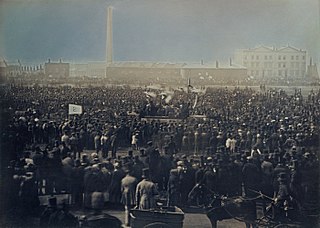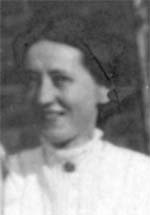
The temperance movement is a social movement promoting temperance or complete abstinence from consumption of alcoholic beverages. Participants in the movement typically criticize alcohol intoxication or promote teetotalism, and its leaders emphasize alcohol's negative effects on people's health, personalities and family lives. Typically the movement promotes alcohol education and it also demands the passage of new laws against the sale of alcohol, either regulations on the availability of alcohol, or the complete prohibition of it. During the 19th and early 20th centuries, the temperance movement became prominent in many countries, particularly in English-speaking, Scandinavian, and majority Protestant ones, and it eventually led to national prohibitions in Canada, Norway, Finland, and the United States, as well as provincial prohibition in India. A number of temperance organizations exist that promote temperance and teetotalism as a virtue.

Chartism was a working-class movement for political reform in the United Kingdom that erupted from 1838 to 1857 and was strongest in 1839, 1842 and 1848. It took its name from the People's Charter of 1838 and was a national protest movement, with particular strongholds of support in Northern England, the East Midlands, the Staffordshire Potteries, the Black Country and the South Wales Valleys. The movement was fiercely opposed by government authorities, who finally suppressed it.
Women's suffrage is the right of women to vote in elections. In the beginning of the 18th century, some people sought to change voting laws to allow women to vote. Liberal political parties would go on to grant women the right to vote, increasing the number of those parties' potential constituencies. National and international organizations formed to coordinate efforts towards women voting, especially the International Woman Suffrage Alliance.
A reform movement or reformism is a type of social movement that aims to bring a social or also a political system closer to the community's ideal. A reform movement is distinguished from more radical social movements such as revolutionary movements which reject those old ideals, in that the ideas are often grounded in liberalism, although they may be rooted in socialist or religious concepts. Some rely on personal transformation; others rely on small collectives, such as Mahatma Gandhi's spinning wheel and the self-sustaining village economy, as a mode of social change. Reactionary movements, which can arise against any of these, attempt to put things back the way they were before any successes the new reform movement(s) enjoyed, or to prevent any such successes.

Henry "Orator" Hunt was a British radical speaker and agitator remembered as a pioneer of working-class radicalism and an important influence on the later Chartist movement. He advocated parliamentary reform and the repeal of the Corn Laws. He was the first member of parliament to advocate for women's suffrage; in 1832 he presented a petition to parliament from a woman asking for the right to vote.
The Radicals were a loose parliamentary political grouping in Great Britain and Ireland in the early to mid-19th century who drew on earlier ideas of radicalism and helped to transform the Whigs into the Liberal Party.
The New Zealand Liberal Party was the first organised political party in New Zealand. It governed from 1891 until 1912. The Liberal strategy was to create a large class of small land-owning farmers who supported Liberal ideals, by buying large tracts of Māori land and selling it to small farmers on credit. The Liberal Government also established the basis of the later welfare state, with old age pensions, developed a system for settling industrial disputes, which was accepted by both employers and trade unions. In 1893 it extended voting rights to women, making New Zealand the first country in the world to enact universal adult suffrage.

Leonora O’Reilly was an American feminist, suffragist, and trade union organizer. O'Reilly was born in New York state, raised in the Lower East Side of New York City. She was born into a working-class family and left school at the age of eleven to begin working as a seamstress. Leonora O’Reilly’s parents were Irish immigrants escaping the Great Famine; her father, John, was a printer and a grocer and died while Leonora was the age of one, forcing her mother, Winifred Rooney O’Reilly, to work more hours as a garment worker in order to support Leonora and her younger brother.

Radicalism was a political movement representing the leftward flank of liberalism during the late 18th and early 19th centuries and a precursor to social liberalism, social democracy, civil libertarianism, and modern progressivism. This ideology is commonly referred to as "radicalism" but is sometimes referred to as radical liberalism, or classical radicalism, to distinguish it from radical politics. Its earliest beginnings are to be found during the English Civil War with the Levellers and later the Radical Whigs.
Owenism is the utopian socialist philosophy of 19th-century social reformer Robert Owen and his followers and successors, who are known as Owenites. Owenism aimed for radical reform of society and is considered a forerunner of the cooperative movement. The Owenite movement undertook several experiments in the establishment of utopian communities organized according to communitarian and cooperative principles. One of the best known of these efforts, which were largely unsuccessful, was the project at New Harmony, Indiana, which started in 1825 and was abandoned by 1829. Owenism is also closely associated with the development of the British trade union movement, and with the spread of the Mechanics' Institute movement.

Harriot Eaton Blatch was an American writer and suffragist. She was the daughter of pioneering women's rights activist Elizabeth Cady Stanton.

Henry Hetherington was an English printer, bookseller, publisher and newspaper proprietor who campaigned for social justice, a free press, universal suffrage and religious freethought. Together with his close associates, William Lovett, John Cleave and James Watson, he was a leading member of numerous co-operative and radical groups, including the Owenite British Association for the Promotion of Co-operative Knowledge, the National Union of the Working Classes and the London Working Men's Association. As proprietor of The Poor Man's Guardian he played a major role in the "War of the Unstamped" and was imprisoned three times for refusing to pay newspaper stamp duty. He was a leader of the "moral force" wing of the Chartist movement and a supporter of pro-democracy movements in other countries. His name is included on the Reformers' Memorial in Kensal Green Cemetery.

George Howell was an English trade unionist and reform campaigner and a Lib-Lab politician, who sat in the House of Commons from 1885 to 1895.

The Social Democratic League was a socialist political party in the Netherlands. Founded in 1881, the SDB was the first socialist party to enter the House of Representatives.

A movement to fight for women's right to vote in the United Kingdom finally succeeded through acts of Parliament in 1918 and 1928. It became a national movement in the Victorian era. Women were not explicitly banned from voting in Great Britain until the Reform Act 1832 and the Municipal Corporations Act 1835. In 1872 the fight for women's suffrage became a national movement with the formation of the National Society for Women's Suffrage and later the more influential National Union of Women's Suffrage Societies (NUWSS). As well as in England, women's suffrage movements in Wales, Scotland and other parts of the United Kingdom gained momentum. The movements shifted sentiments in favour of woman suffrage by 1906. It was at this point that the militant campaign began with the formation of the Women's Social and Political Union (WSPU).
The Reform League was established in 1865 to press for manhood suffrage and the ballot in Great Britain. It collaborated with the more moderate and middle class Reform Union and gave strong support to the abortive Reform Bill 1866 and the successful Reform Act 1867. It developed into a formidable force of agitation at the very heart of the country.
Benjamin Lucraft was a famous craftsman chair-carver in London where his radical inclinations led him to be involved in many political movements.
Social feminism is a feminist movement that advocates for social rights and special accommodations for women. It was first used to describe members of the women's suffrage movement in the late nineteenth and early twentieth centuries who were concerned with social problems that affected women and children. They saw obtaining the vote mainly as a means to achieve their reform goals rather than a primary goal in itself. After women gained the right to vote, social feminism continued in the form of labor feminists who advocated for protectionist legislation and special benefits for women. The term is widely used, although some historians have questioned its validity.

The International Socialist Congress, Stuttgart 1907 was the Seventh Congress of the Second International. The gathering was held in Stuttgart, Germany from 18 to 24 August 1907 and was attended by nearly 900 delegates from around the globe. The work of the congress dealt largely with matters of militarism, colonialism, and women's suffrage and marked an attempt to centrally coordinate the policies of the various socialist parties of the world on these issues.

The Reform movement in Upper Canada was a political movement in British North America in the mid-19th century.